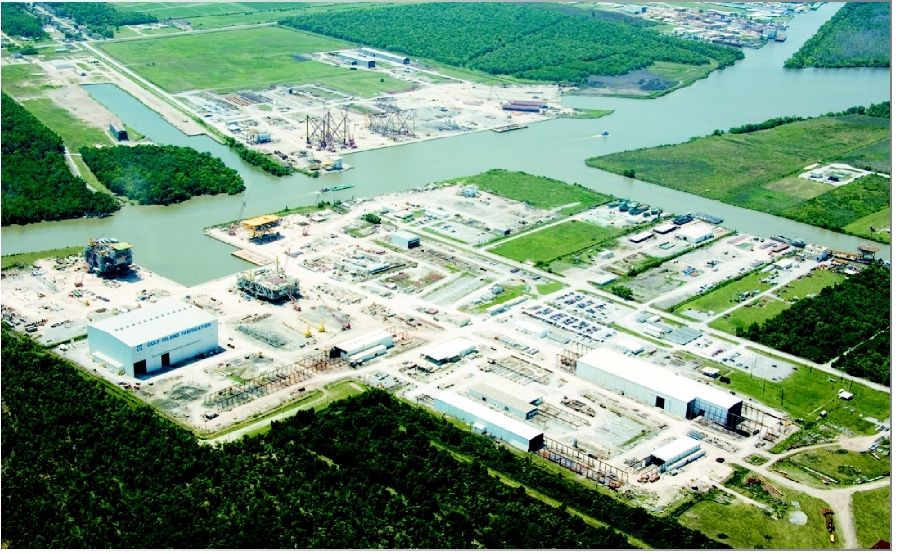
Milford Lirette Sr.
February 25, 2015
Sweet Revenge! After losing in the finals to Ben Franklin last season, Terriers score reception; win Division II Title
March 3, 2015As oilfield service companies in Cajun country navigate recent changes in their industry for better and worse, some long-standing businesses point to their history of adaptability as proof that they can weather storms on the horizon, and also meet the challenges that positive opportunities present.
Gulf Island is one of those, born out of the storm created by the oil bust of the 1980s, and has continued to flourish even under changes in leadership.
As part of the team that guided Gulf Island for 18 years, current CEO Kirk Meche fit well into the position of president, which opened up after Kerry Chauvin, an icon of offshore oil service, retired in 2013. Meche has described Chauvin as a selfless mentor, and has credited the firm’s emphasis on quality work and well-thought investment in technology and equipment as key to its longevity.
“Since 1985, the company’s success has been built on quality construction, expansion of facilities and capabilities, investment in technology and equipment, and the safety and training of our employees,” reads an official Gulf Island statement. “In fact, Gulf Island’s quality control system and safety records are some of the best in the energy industry.”
Together and with other members of their team, Meche and Chauvin created Gulf Island Marine Fabricators as part of a corporate family that includes Dolphin Services and Gulf Island Fabrication Inc., increasing the ability to provide needed services and products to meet the offshore industry’s needs.
The Gulf Island Marine Fabricators subsidiary opened in 2008, during a slow period in the industry, and brought to the company a new dry dock, fabrication shop and office warehouse.
Towboats, barges, tugs and even casino boats began rolling off the division’s facilities, enhancing a business built on free-standing oil rigs servicing the Gulf of Mexico oilfield and other petroleum operations.
The 2008 expansion followed Gulf Island’s 2006 acquisition of Gulf Island Marine Fabricators in Aransas Pass, Texas.
The Texas location boasts a 45-foot deep ship channel, which is far less limiting than the Houma Navigational Canal’s 15-foot maximum depth at the Houma site.
Meche said Gulf Island Marine Fabricators has a 45-foot deep ship channel, which allows the company to provide its customers with the largest fabrication capacity on the Gulf of Mexico.
Although Gulf Island has increased its ties to Texas – where the majority of its clients are located – the Terrebonne Parish operations are expected to continue.
A move from New Orleans and other south Louisiana locations by some oil companies occurred, Meche has said in interviews, as a result of difficulties related to hurricanes Katrina and Rita. Planting more roots in Texas seemed a logical response. But the Houma base of operations is still considered a vital part of the company’s operation.
Meche has praised the hard work and loyalty of the company’s Houma-area employees, many of whom have been with the firm from the beginning.
A deeper Houma Navigational Canal would benefit not only Gulf Island but other local companies that do business in the oilfield.
Gulf Island is not one of the Port of Terrebonne’s tenants, although their Houma operation is close by. Even so, Port of Terrebonne director David Rabalais says the company is an invaluable tile in the mosaic of the area’s oil-and-gas related businesses.
“They are very important,” Rabalais said. “At one time they had close to 2,000 employees here. Economy-wise they are extremely important.”
Rabalais has been at the forefront of local officials seeking a deeper channel, a goal shared with Gulf Island.
“For the oil and gas industry we need a deeper channel period,” the port director said, echoing Meche’s position. “The industry is going to bigger and bigger vessels and if we do not deepen the channel we are going to slowly die on the vine. We will lose an industry that we pioneered.”
The company was founded in 1985 by Alden LaBorde and Huey Wilson. They owned the company until it became publicly traded in 1997. The investors had already proven themselves in the industry with pioneering developments in rig construction. Gulf Island began operations on a 608-acre Houma campus.
Despite the corporate move to Texas, the company’s president said there is no plan to move operations out of Terrebonne Parish, acknowledging the hard work of longtime employees, many of whom have been with the company for more than 25 years.
Although newer than some other local firms, Gulf Island is still considered a pioneering force, particularly in its ability to meet the needs of the expanding deep-water drilling portion of the industry.
Its investment in the local economy is expressed in its continued work with local schools to help develop the oil-and-gas workforce.
“The key to continuing our business in Terrebonne Parish is educating our young students as they come up to give them the skills they need in order to step in and help us run these businesses in the future,” Meche said in an interview. “And then themselves become leaders of Terrebonne Parish.”
‘The key to continuing our business in Terrebonne Parish is educating our young students as they come up to give them the skills they need in order to step in and help us run these businesses in the future.’
CEO Kirk Meche
Gulf Island’s Fabrication yard in east Houma was expanded in 2008 to include Gulf Island Marine Fabricators, the company’s marine division, which constructs towboats, barges, tugs and lifeboats. Approaching its 30 year anniversary, the Houma-born company expects to expand its services into the offshore wind farms along the East Coast.










